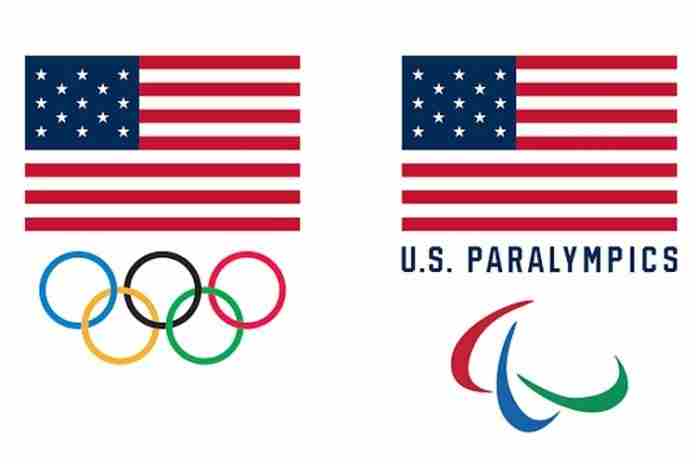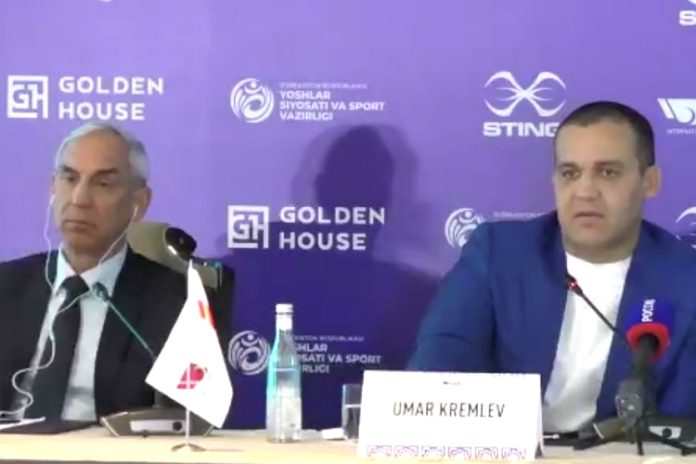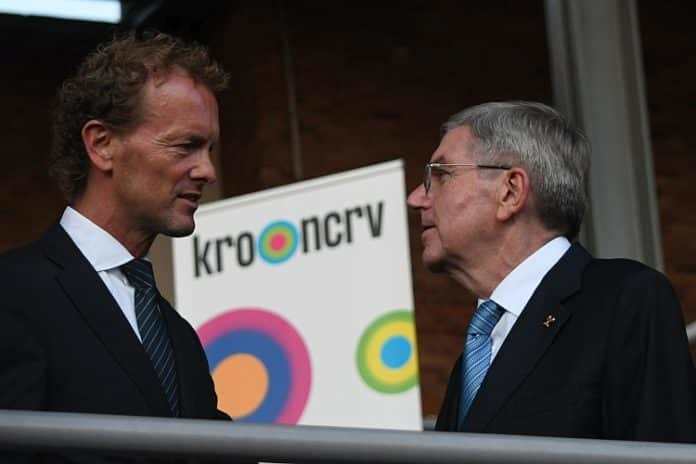★ The Sports Examiner: Chronicling the key competitive, economic and political forces shaping elite sport and the Olympic Movement.★
★ To get The Sports Examiner by e-mail: sign up here! ★
≡ THE 5-RING CIRCUS ≡
1. Stevens Act will control IBA plan to pick new U.S. governing body
2. FIFA asks more for 2023 Women’s World Cup, or won’t show it!
3. Johnson home designation approved by L.A. City committee
4. IJF refuses eight of 18 Russian World Championships entries
5. Russia projecting team of 180 for Paris if allowed to compete
International Boxing Association President Umar Kremlev of Russia told a Monday news conference the federation plans to accredit a new member federation in the U.S. in the aftermath of the withdrawal of USA Boxing. He says he has multiple applicants, but may be unaware that by U.S. law, the selection of a sport’s national governing body has much more to do with the U.S. Olympic & Paralympic Committee than any international federation. FIFA President Gianni Infantino said the 2023 Women’s World Cup in Australia and New Zealand may be blacked out in Europe if broadcasters do not pay more for the rights. In Los Angeles, a City Council committee approved a request for Historic-Cultural Monument status for the Cornelius Johnson home and Olympic Oak; the matter goes now to the City Council for final approval, which must be made by 12 May. The International Judo Federation approved Russian and Belarusian athletes for competition as neutrals, but has rejected eight of 18 Russian entries for the upcoming World Championships in Qatar that start this weekend. This could be a precedent. The Russian sports minister projects that if allowed to compete in qualifying events and without any team-sport entries, Russia could send a team of 180 to the Paris 2024 Olympic Games. That would be the fewest since the Russian Empire sent 159 to the Stockholm Games in 1912!
● Panorama: Athletics (3: AIU April sanctions report led by five Vietnamese, three Russians; Atlanta 1996 400 m hurdles bronze winner Davis passed at 51; first-ever ban for online abuse leveled at British T&F official) = Swimming (Dressel to return to competition on 12 May; ex-Soviet swimmer and Moscow 1980 silver medalist arrested for drug sales in India) ●
1.
Stevens Act will control IBA plan to pick new U.S. governing body
At Monday’s International Boxing Association news conference at its men’s World Championships in Tashkent (UZB), President Umar Kremlev (RUS) was asked about the withdrawal of USA Boxing. According to the Russian news agency TASS:
“The American association has left, but we already have more than five applications from the USA from organizations that are ready to develop boxing in the country. We have created a special commission that will study which of them we accredit. But the decision [to leave] was not made by boxers, but by officials who decided to break the faith of athletes, American boxers write to me, complaining that they are not allowed [to compete].
“Only hyenas or jackals do this, you can’t call them otherwise. They should be pointed to their place, shown that they are outcasts of society and cleanse the sport of such people. The functionary’s task is to ensure the participation of the athlete, and not to tell them where to go.”
Regardless of Kremlev’s view of the U.S. federation, the IBA’s “accreditation” of a U.S. member association is not completely up to him or the IBA. The United States Olympic & Paralympic Committee also has a substantial say.
That say is codified in the U.S. Code in Title 36, Chapter 2205, also known today as the Ted Stevens Olympic & Amateur Sports Act, first passed in 1978 and amended in 1998, 2006, 2018 and 2020.
It’s quite specific on National Governing Bodies, including:
● Sec. 220521, requiring that the USOPC “may not certify more than 1 national governing body.”
● Further, sub-section (c) notes that once a National Governing Body for a sport has been selected, the USOPC “shall recommend and support in any appropriate manner the national governing body to the appropriate international sports federation as the representative of the United States for that sport.”
So, it’s the USOPC which tells the International Federations who their national federation is, not the other way around.
● Sec. 220522 specifies the requirements for an NGB, including, among other items:
“the managerial and financial capability to plan and execute its obligations, including the ability to provide and enforce required athlete protection policies and procedures”
and
“demonstrates that it is a member of no more than one international sports federation that governs a sport included on the program of the Olympic Games, the Paralympic Games, the Pan-American Games, or the Parapan American Games.”
Big problem for the IBA here. It has been suspended by the International Olympic Committee since 2019 and is not the governing body of boxing insofar as it concerns the Olympic Games – controlled by the IOC itself – or the 2023 Pan American Games, which will be a Paris 2024 qualifier, also overseen by the IOC’s “Paris Boxing Unit.”
Without the designation as the federation which “governs a sport included on the program” of the Olympic Games or Pan American Games, the IBA cannot be an “appropriate” International Federation for a U.S. national federation to belong to.
(The 12-page USA Boxing qualifying procedures for selection for the Paris 2024 Games never mentions the IBA, only the IOC and its process.)
The Stevens Act enumerates the purposes for which the USOPC is authorized and a major aspect listed in §220503 is:
“(4) to obtain for the United States, directly or by delegation to the appropriate national governing body, the most competent amateur representation possible in each event of the Olympic Games, the Paralympic Games, the Pan-American Games, and the Parapan American Games.”
Can’t do that if you’re on suspension by the IOC. And the USOPC’s authority in this area is clear, as §220503 (3) includes:
“exclusive jurisdiction, directly or through constituent members of committees, over—
(A) all matters pertaining to United States participation in the Olympic Games, the Paralympic Games, the Pan-American Games, and the Parapan American Games, including representation of the United States in the games” and much more.
Moreover, the road to even challenge USA Boxing as the U.S. national governing body can’t begin until 6 November of 2023. Section 220528, concerning “Applications to replace an incumbent national governing body” states:
“An amateur sports organization may seek to replace an incumbent as the national governing body for a particular sport by filing a written application for certification with the [USOPC] … within one year after the final day of—
“(A) any Olympic Games, for a sport in which competition is held in the Olympic Games or the Paralympic Games, or in each of the Olympic Games, the Paralympic Games, the Pan-American Games, and the Parapan American Games; or
“(B) any Pan-American Games or Parapan American Games, for a sport in which competition is held in the Pan-American Games or the Parapan American Games, as applicable, but not in the Olympic Games or the Paralympic Games.”
The 2023 Pan Am Games in Santiago, Chile end on Sunday, 5 November. No application to the USOPC can even be filed until then. If one is filed, the procedure requires a public hearing within six months, with USA Boxing also invited to present. Any new body must show that
“the applicant more adequately meets the criteria of section 220522 of this title [eligibility], is capable of more adequately meeting the criteria of sections 220524 [duties] and 220525 [sanctioning] of this title, and provides or is capable of providing a more effective national program of competition than the national governing body in the sport for which it seeks certification.”
A tall order, for sure.
The crux of the matter will be whether the IBA once again becomes the governing body of Olympic boxing, or some other association – perhaps the new World Boxing group – is so designated.
Right now, the IBA’s choice for a “new” U.S. national federation won’t mean much to the one group that – under U.S. law – counts, the U.S. Olympic & Paralympic Committee.
2.
FIFA asks more for 2023 Women’s World Cup, or won’t show it!
The 32-team 2023 FIFA Women’s World Cup begins on 20 July in Australia and New Zealand, but FIFA chief Gianni Infantino (SUI) said in a Monday Instagram post and during a women’s trade conference in Geneva (SUI) that the tournament may be blacked out in England, France, Germany, Italy, Spain and elsewhere in Europe! Here it is:
“Today, I have repeated my call for broadcasters to pay a fair price for FIFA Women’s World Cup 2023? media rights. We did our part: FIFA has raised the prize money to USD 152 million, treble the amount paid in 2019 and ten times more than in 2015 (before I became FIFA President).
“However, the offers from broadcasters, mainly in the ‘Big 5’ European countries, are still very disappointing and simply not acceptable, especially considering that:
“1) 100% of any rights fees paid would go straight into women’s football, in our move to promote actions towards equal conditions and pay;
“2) public broadcasters in particular have a duty to promote and invest in women’s sport;
“3) the viewing figures of the FIFA Women’s World Cup are 50-60% of the men’s FIFA World Cup (which in turn are the highest of any event), yet the broadcasters’ offers in the ‘Big 5’ European countries for the FIFA Women’s World Cup are 20 to 100(!) times lower than for the men’s FIFA World Cup; and
“4) concretely, whereas broadcasters pay USD 100-200 million for the men’s FIFA World Cup, they offer only USD 1-10 million for the FIFA Women’s World Cup. This is a slap in the face of all the great FIFA Women’s World Cup players and indeed of all women worldwide.
“So, to be very clear, it is our moral and legal obligation not to undersell the FIFA Women’s World Cup. Therefore, should the offers continue not to be fair (towards women and women’s football), we will be forced not to broadcast the FIFA Women’s World Cup into the ‘Big 5’ European countries.
“I call, therefore, on all players (women and men), fans, football officials, Presidents, Prime Ministers, politicians and journalists all over the world to join us and support this call for a fair remuneration of women’s football.
“Women deserve it! As simple as that!”
Infantino did not disclose the bids from any of the broadcasters from these countries. It is worth noting that schedule shows most of the matches will be held in the late morning in the European time zones – Australia is eight hours and New Zealand in 10 hours ahead of Central European Time – not the most favorable for a large audience.
Infantino, of course, does not agree:
“It doesn’t make any economic sense because the viewing figures are there. Maybe, because it is in Australia and New Zealand, it’s not played on prime-time in Europe, but still, it is played at 9am or 10am, so it is quite a reasonable time.”
There isn’t a lot of time remaining, but a sale even weeks before would allow for broadcasting in the European markets since the feed of the matches is being produced by FIFA. This will be interesting.
3.
Johnson home designation approved by L.A. City committee
The long and winding path of the Cornelius Johnson home and Olympic Oak in Los Angeles moved slightly forward on Tuesday with a committee approval of its designation as a Los Angeles Historic-Cultural Monuments.
The property, originally built by Johnson’s father in 1903 at 1156 South Hobart Avenue in midtown Los Angeles, includes a very special “Olympic Oak,” grown from a seedling given to Johnson for winning the men’s high jump at the Games of the XI Olympiad in Berlin, Germany in 1936.
This was the Nazi Games and Johnson, who had finished fourth in the 1932 Los Angeles Games, won at 2.03 m (6-8) on the first day of track & field on 2 August. It was Johnson whom German leader Adolf Hitler snubbed, not wanting to congratulate a Black athlete after seeing two Germans and a Finn win the prior events on that day.
As with all of the gold medalists in Berlin, Johnson was given a “Olympic Oak” seedling to take with him and plant at home. He did so and the tree grew spectacularly from 1936 until recent years when it was essentially abandoned.
Today, it is one of six believed to be remaining in the U.S. and one of 25 worldwide still living (out of 130 given).
Johnson passed away in 1946, but his home remained in the family until its sale in 1994. The family who followed the Johnsons maintained the tree in good shape, but it fell into distress since the sale in 2019 to KLD Investment, LLC, which had plans to develop the property, but now wants to sell it.
The property continues to be for sale, listed at $1.09 million; it was purchased by the current owner on 1 May 2019 for $927,000. The prior sale was in 1994 for $175,000. The tree is now being watered through an intervention by the Huntington Gardens.
Community interest in the tree and the Johnson home led to an application to the Los Angeles Cultural Heritage Commission for Historic-Cultural Monument status, which was approved in August 2022.
To obtain the designation, the matter then had to come to the Los Angeles City Council’s Planning & Lane Use Management (PLUM) committee and finally made it on Tuesday (2nd). Only three of the five committee members were present: Marqueece Harris-Dawson (District 8), John Lee (12th) and Heather Hutt (10th, in which the property is located).
Two public speakers commented in favor of the designation and neither owner KLD Investments or the original proposers – Susan Anderson of the California African American Museum, and architect and preservation advocate Christian Kosmas Mayer – spoke during the discussion. The entire matter was concluded in just 3:47 with a unanimous vote for designation. Said Hutt:
“As the Planning Department has noted, this is a historical tree and home. It was certainly the ‘west side’ [of Los Angeles] when the Johnson family built the home, which was an unusual place for Black people to live with the [racial] covenants then on.
“And then for this man to be a two-time Olympian is really important. I feel like we need to protect this space. When the Olympics come here in 2028, that it will be a destination for all the comers to Los Angeles.”
The Historic-Cultural Monument designation now goes to the City Council for final approval, which must be completed by 12 May under the City’s timeline requirements.
There has been talk of a purchase of the property by a non-profit, but no one has come forward yet. While the Historic-Cultural Monument designation could come soon, the future of the property is anything but assured.
But Johnson’s Olympic Oak, now 88 years old, is still hanging in there.
4.
IJF refuses eight of 18 Russian World Championships entries
The International Judo Federation confirmed Saturday that it would allow “athletes from Russia and Belarus to participate in IJF events as individual neutral athletes,” as it had done since the middle of 2022.
However, it also qualified the approval with a procedure, based on the recommendations of the International Olympic Committee:
“The Executive Committee has decided to engage an independent, reputable company to perform background checks on all the individuals proposed for participation, including social media content, with specific reference to possible war propaganda. Only those athletes and support personnel who are cleared during this verification process will be eligible and considered for participation in events by the IJF Executive Committee.”
By Monday, the entry list for the 2023 IJF Worlds in Doha, Qatar from 7-13 May showed 20 “Individual Neutral Athletes,” with 18 Russians (nine men, nine women) and two from Belarus (1+1).
On Tuesday, that number was reduced by the IJF:
“The IJF Executive Committee has received the list of proposed participants and has commissioned independent background checks on the athletes and delegates to ensure both their place of employment and any social media interactions regarding pro-war propaganda. …
“Only athletes employed at the Federal Training Sport Center of the representative teams of Russia and athletes for whom no information was identified suggesting support for or views on the Russian invasion of Ukraine have been approved to compete at the World Judo Championships 2023 and in IJF competitions. After conducting thorough background investigations, eight members of the delegation were rejected from participation following the Executive Committee vote. …
“The International Judo Federation will continue to monitor the situation and conduct further investigations to ensure that all athletes are participating ethically and in accordance with the rules and regulations of the sport and the judo values.”
The eight athletes removed were not identified, but the announcement indicates that members of the famed CSKA or Dynamo sports clubs were not permitted to compete. It appears the two Belarusians – Yahor Varapayeu in the men’s 90 kg class and Darya Kantsavaya in the women’s 78 kg class – were approved.
This is a precedent for other federations, none of which have been this fast in bringing Russian and Belarusian athletes back into competition.
Ukraine announced on Monday that it would not compete at the 2023 Worlds with Russian or Belarusian athletes present and competing. The IJF Worlds begin on Sunday.
5.
Russia projecting team of 180 for Paris if allowed to compete
“If our athletes successfully pass the qualifying tournaments and the conditions are not significantly changed, then the maximum number of participants from the Russian side in the Olympic Games will be about 180 athletes. …
“In total, international federations in 12 Olympic and 13 non-Olympic sports supported the admission of Russian athletes to international competitions. But nine organizations have not yet given clear criteria for admission to competitions.”
That’s Russian sports minister Oleg Matytsin, speaking after a meeting with Russian President Vladimir Putin about the prospects for Russian participation in the Paris 2024 Olympic Games.
That’s way below the athlete totals from prior Games this century:
● 2000: 435
● 2004: 446
● 2008: 455
● 2012: 436
● 2016: 282 (reduced due to doping sanctions)
● 2020: 335 (reduced due to doping sanctions)
In fact, a total of 180 athletes would be the smallest number from a Russian team since 159 competed for the Russian Empire in 1912 in Stockholm. As the USSR, a team did not compete until 1952 (295).
Matytsin said the decision on Russian participation in Paris will not be made before 26 July 2023 and probably much later.
Meanwhile, Putin was reported to have told Matytsin and others:
“You and I are well aware that the main problems of modern high-performance sports are related to the excessive commercialization of sports. Hence both corruption and political dependence. But as the multipolarity of the modern world strengthens, the situation will change in international sports as well. It will change for the better. In any case, I really hope so.”
In this regard, Matytsin said that plans for a new multi-sport competition are emerging, with a 2024 target date:
“The situation today confirms the importance and necessity of further strengthening the sports agenda within the framework of interstate associations, such as the [Commonwealth of Independent States], [Shanghai Cooperation Organization] and BRICS, which are not subject to sanctions and restrictions from international sports structures. In 2024, under the Russian chairmanship of the BRICS association, we propose to hold the BRICS Games in our country, we consider this to be especially relevant, given the prospect of expanding the BRICS format in terms of the number of countries.”
(BRICS refers to Brazil, Russia, India, China and South Africa.)
Russian access to qualification competitions remains at issue. While at least some Russian entries will be allowed at the upcoming Judo World Championships, the Russian Fencing Federation says it is being stonewalled by the International Fencing Federation (FIE), which approved Russian and Belarusian participation as neutrals back in March. Said Russian Fencing Federation (FFR) President Ilgar Mammadov:
“The FIE office does not respond to our letters, the release on athletes and specialists has not yet been received. Today our colleague from Belarus also called their office, where he was told that they were not authorized to answer these questions. Judging by everything, there is no international law in sports anymore, as there are ethical norms of behavior… If for some reason the FIE office was offended by the FFR, why don’t they respond to the Belarusians as well?”
Mammadov explained this means no Russians will compete at the Epee Grand Prix in Cali (COL) this weekend, or the men’s Foil World Cup in Acapulco (MEX):
“We are definitely missing the next two tournaments. Today we sent a corresponding letter to the Russian Ministry of Sports so that these tournaments were removed from the plan. We do this at the very last moment, but, I hope, the Ministry of Sports understands that we have to wait until it stops in the hope that something will happen after all.
“My foreign colleagues from the United States, who were waiting for us in Acapulco, were very surprised that we would not come, and they cannot understand how the FIE office can simply not respond. It turns out that they can.”
≡ PANORAMA ≡
● Athletics ● The Athletics Integrity Unit published its sanctions recap for April, with 19 individuals listed:
● 5: Vietnam
● 3: India and Russia
● 1: Germany, Italy, Kenya, Morocco, New Zealand, Trinidad & Tobago, Uzbekistan and the U.S.
The American was shot put star Raven Saunders, suspended for 18 months for whereabouts reporting failures.
¶
Sad news of the passing of 1996 Olympic 400 m hurdles bronze medalist Calvin Davis on Sunday, 1 May, at just 51 years of age.
Davis ran 47.91 in his Olympic semi in Atlanta for his all-time best, then no. 7 in American history. He was the 1993 NCAA champion at 400 m for Arkansas (45.04), then won the NCAA Indoor 400 m title in 1994 before switching to the hurdles and making the U.S. Olympic team just two years later.
At the time of his death, he was an assistant track and field coach at Springdale Har-Ber High School in Springdale, Arkansas.
¶
Britain’s Athletics Weekly reported that an athletics official was banned from the sport by UK Athletics for online abuse:
“[Paul] Baxter, a former member of City of York AC, has been given a three-and-a-half year ban from the sport for online bullying and harassment of Katey Ross, a former athlete who acts as an administrator on the popular Facebook group ‘I Was, Or Am A Runner!’
“Baxter was charged by England Athletics with ‘making a number of inappropriate, threatening, bullying or harassing online posts’ toward Ross, who waived her anonymity in the case.”
It’s believed to be the first instance of a ban imposed for online actions. It will not be the last.
● Swimming ● Five-time Tokyo Olympic gold medalist Caeleb Dressel of the U.S. has been absent from the pool since leaving the 2022 World Championships after a couple of days last June. But he appears ready to re-emerge and is expected to compete in the Atlanta Classic on 12 May.
If fit, the 26-year-old can qualify for the 2023 Worlds at the USA Swimming nationals from 27 June-1 July in Indianapolis.
¶
SwimSwam.com reported that 1980 Olympic 200 m Breaststroke silver medalist Svetlana Varganova was arrested for involvement as part of a drug cartel in Goa, India.
An Indian Narcotics Control Bureau said that Varganova, 58, sold drugs only to foreigners and have been uncooperative. She was arrested along with a former Russian policeman known as Andre and reportedly the head of the drug ring.
¶
You can receive our exclusive TSX Report by e-mail by clicking here. You can also refer a friend by clicking here, and can donate here to keep this site going.
For our updated, 651-event International Sports Calendar (no. 2) for 2023 and beyond, by date and by sport, click here!





















